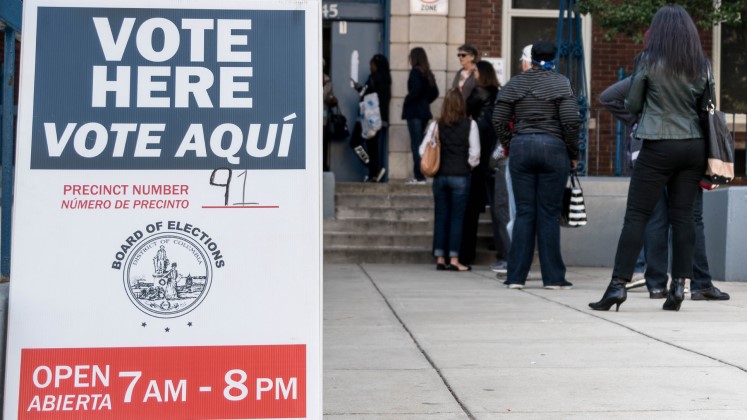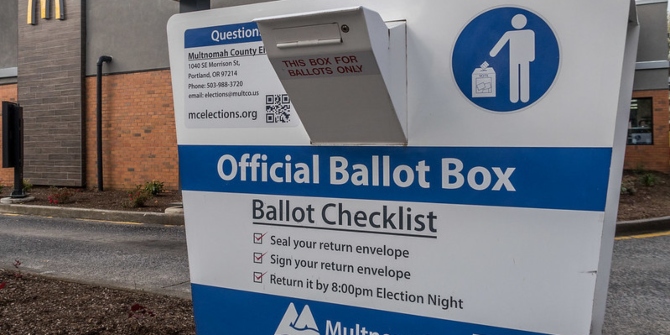 Nikki Haley, former governor of South Carolina and former US Ambassador to the United Nations, has officially entered the 2024 Republican primary race for president. In this Q&A, Thomas Gift discusses her candidacy, her perceived strengths and weaknesses, and what it means for Trump’s chances of regaining the nomination in 2024.
Nikki Haley, former governor of South Carolina and former US Ambassador to the United Nations, has officially entered the 2024 Republican primary race for president. In this Q&A, Thomas Gift discusses her candidacy, her perceived strengths and weaknesses, and what it means for Trump’s chances of regaining the nomination in 2024.
Can Nikki Haley make a splash in the Republican primaries?
Haley’s campaign will be a real high-wire act. She did say in the past that she wouldn’t run in 2024 if Donald Trump declared his candidacy (which he did last November). She’s now changed her tune. But she’s in a tough place of trying to court former Trump voters, without alienating his base. Temperamentally, Haley isn’t at all Trumpy, but she needs to articulate a clearer rationale for her candidacy that goes beyond personal charisma. Haley likely won’t be the only diverse candidate in the race (Sen. Tim Scott, who’s Black, is also contemplating a bid). She likely won’t be the youngest (Ron Desantis is 44 to her 51). And she won’t be the candidate with the most direct Washington experience (that’s Trump, of course). So for her to soar in the polls, Haley will need to find a way to differentiate herself in what looks to be an increasingly crowded field.
Where might Haley distinguish herself?
Policy-wise, Haley offers a fairly standard fare of Republican positions. So she’ll most likely to try to stand out on foreign policy, where she’ll lean into her credentials as former ambassador to the United Nations. Especially in light of events globally, including Putin’s war in Ukraine and America’s icy tensions with China, that may be a timely sell. As ambassador, Haley did make some headlines, accusing, for example, the UN of bullying Israel and advocating the US relocate its Israeli Embassy from Tel Aviv to Jerusalem. But some of Haley’s counterparts have also questioned her depth of knowledge on foreign affairs and her general work ethic. Haley also only served as UN ambassador for two years, so it’s not extensive high-level experience. If, for example, former Trump Secretary of State Mike Pompeo becomes a candidate, suddenly Haley’s foreign policy chops look less impressive.
Could Haley’s identity as a woman of color affect her candidacy?
A growing number of Republicans would like to see a woman, and a person of color, represent their party in the White House. And many would like to see the party diversify generally. That’s not to say that Haley won’t face any double standards and that some sections of the conservative electorate won’t be reluctant to vote for Haley because of her identity. But it’s a dwindling fraction. If Haley doesn’t get the nomination, it almost certainly won’t be because she’s a woman or Asian American. First of all, Haley was elected governor in a deep red state, South Carolina. Moreover, the fact that Haley is already emphasizing her identity in her kickoff campaign ad is evidence that she herself doesn’t think it will be a liability. For example, she remarked that when you “kick back” at bullies, “it hurts them more when you’re wearing heels.”
What does this all mean for Trump and the broader Republican primary field?
The real question is whether Haley’s announcement breaks open the dam, and we start to see other Republicans enter the race. We know that Trump has a floor of support, about 25-30 percent of the Republican electorate. And the more candidates who jump into the fray and have the potential to split the “maybe-” or “never-Trump” vote, the more likely Trump can come away with victories, especially in early winner-take-all primaries. That’s the problem with much of the conversation about Trump vs. DeSantis. It’s not Trump vs. DeSantis. It’s Trump vs. everyone else. In head-to-head matchups, it might look like any number of Republicans can go toe-to-toe with Trump. But that’s just not how the primary system works. That said, one point to look for is whether more states do shift to proportional allocation of delegates in their primaries, which could help Trump alternatives by keeping them in the race for longer.
- Featured image credit: “Nikki Haley” (CC BY-SA 2.0) by Gage Skidmore
Please read our comments policy before commenting.
Note: This article gives the views of the author, and not the position of USAPP – American Politics and Policy, nor the London School of Economics.
Shortened URL for this post: https://bit.ly/3S2xvBh







Does Glenn Younglin have a real chance should he decide to run please Tomas?